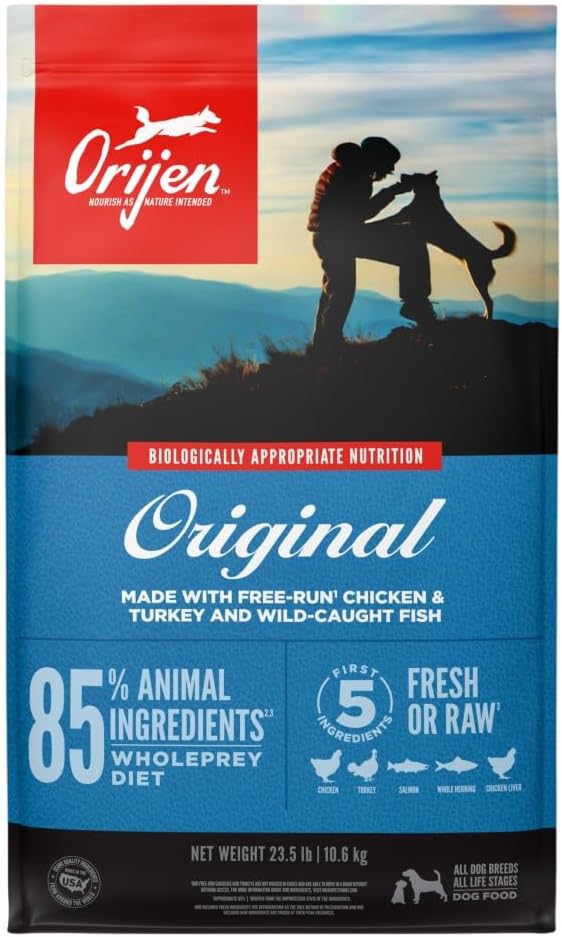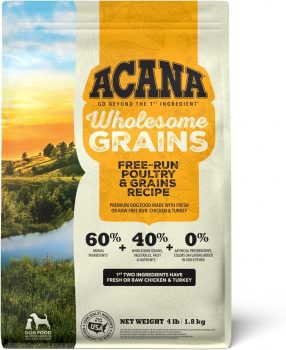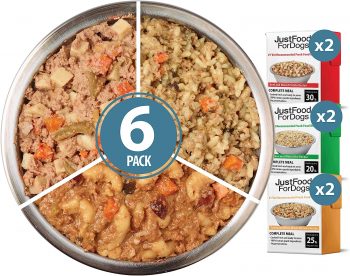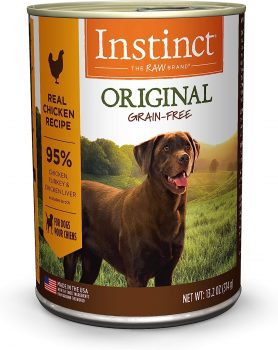With their distinctive appearance and gentle demeanor, Bulldogs have become a beloved breed. However, they come with specific dietary needs due to their unique physical structure and potential health issues. This guide will provide comprehensive insights into the ideal diet for Bulldogs, ensuring they receive optimal nutrition for their health and well-being-.
Understanding Bulldogs’ Nutritional Requirements
Bulldogs need a balanced diet rich in proteins, fats, carbohydrates, vitamins, and minerals. Given their moderate activity levels and tendency towards obesity, it’s essential to manage their calorie intake carefully. High-quality protein supports muscle maintenance, fats provide energy and maintain skin health, while carbohydrates offer additional energy and aid digestion.
Our 5 Top Foods for Bulldogs
The diets were selected by our founder Justin Palmer, a certified canine nutrition expert, specifically with bulldogs in mind:
| Food | Pros | Cons |
|---|---|---|
|
|
|
|

Check Today's Price on: |
|
|

Check Today's Price on: |
|
|

Check Today's Price on: |
|
|

Check Today's Price on: |
|
|
High-Quality Protein: A Must for Bulldogs
Proteins are vital for Bulldogs to maintain healthy muscle mass. Sources like chicken, beef, fish, and eggs provide essential amino acids necessary for their well-being. Given Bulldogs’ predisposition to allergies, hypoallergenic protein sources such as lamb or fish can sometimes be better options.
Balancing Fats in a Bulldog’s Diet
Fats are crucial for energy and coat health but must be balanced to prevent obesity. Omega-3 and omega-6 fatty acids in fish oil and flaxseed support skin health and contribute to a glossy coat. The fat content in their diet should be closely monitored to avoid excessive weight gain.
The Importance of Carbohydrates and Fiber
Carbohydrates provide Bulldogs with the necessary energy and should come from whole grains, fruits, and vegetables. These also offer fiber, which is essential for their digestive health. However, it’s crucial to monitor carbohydrate intake to prevent obesity.
Essential Vitamins and Minerals
A balanced Bulldog diet should include vitamins and minerals to support various body functions, including bone health, immune system strength, and metabolic processes. Commercial dog foods are typically fortified with these nutrients, but supplementation can be considered under veterinary advice.
Hydration: Keeping Bulldogs Well-Hydrated
Bulldogs need constant access to fresh, clean water. Adequate hydration is essential for their health and helps prevent urinary tract issues. This is particularly important due to their susceptibility to overheating and breathing difficulties.
Feeding Schedule and Portion Control for Bulldogs
Bulldogs benefit from a structured feeding schedule, usually two meals per day. Portion control is essential to prevent obesity, a common issue in Bulldogs. The amount of food should be based on their age, size, and activity level and adjusted as needed.
Special Dietary Considerations for Bulldog Puppies
Bulldog puppies have different dietary needs compared to adult Bulldogs. They require more calories and nutrients to support growth and development. Ideally, Puppy-specific formulas are recommended for medium to large breeds.
Managing Common Bulldog Health Issues Through Diet
Bulldogs are prone to specific health issues, including hip dysplasia, skin allergies, and respiratory problems. A diet that supports joint health is hypoallergenic and easy to chew and digest can be beneficial in managing these conditions.
Choosing the Right Food: Dry Kibble, Wet, or Raw?
Selecting the right food type for Bulldogs can vary based on individual preferences and health needs. High-quality dry kibble can help maintain dental health, wet food can be more palatable, and raw diets offer freshness but require careful preparation and handling.
Supplements: Beneficial Additions to Bulldog Diets
Some Bulldogs might benefit from supplements such as glucosamine for joint health, omega-3 fatty acids for skin and coat health, and probiotics for digestive health. Please consult a veterinarian before introducing supplements to ensure they are appropriate and balanced.
Human Foods: Safe and Unsafe Options for Bulldogs
Certain human foods are safe for Bulldogs in moderation, including lean meats, some vegetables, and fruits. However, avoiding foods toxic to dogs, such as chocolate, grapes, onions, and foods containing xylitol is essential.
The ideal diet for a Bulldog provides balanced nutrition to support their unique needs and helps prevent common breed-specific health issues. Regular consultation with a veterinarian is crucial to ensure that your Bulldog’s diet continues to meet their evolving needs. Remember, a well-nourished Bulldog is a happy, healthy companion for years to come.
What Health Issues Are Bulldogs Prone To, and How Can a Proper Diet Help?
Bulldogs, cherished for their lovable and gentle nature, are unfortunately predisposed to various health issues. Many of these concerns can be alleviated or managed with a proper diet, emphasizing the importance of nutrition in their care. This article provides an in-depth look at common health issues in Bulldogs and how an appropriate diet can be crucial in managing these conditions.
Obesity and Weight Management in Bulldogs
Bulldogs are particularly prone to obesity, which can exacerbate health problems like joint pain, heart disease, and diabetes. A diet controlled in calories and fats and regular exercise is crucial. Feeding measured portions and limiting treats are critical strategies for maintaining a healthy weight.
Joint and Bone Health: Nutrition’s Role
Joint issues such as hip dysplasia are common in Bulldogs. Diets enriched with omega-3 fatty acids, glucosamine, and chondroitin can support joint health and reduce inflammation. Maintaining an ideal weight is also essential to reduce stress on joints.
Addressing Skin Allergies Through Diet
Bulldogs often suffer from skin allergies that can lead to discomfort and infection. Hypoallergenic diets, or those with limited ingredients, can help identify and avoid allergens. Foods rich in omega-3 and omega-6 fatty acids can improve skin health and coat quality.
Breathing Issues and Dietary Considerations
Due to their brachycephalic nature, Bulldogs often struggle with breathing issues. A diet that’s easy to chew and digest can reduce the risk of respiratory distress during meals. Avoiding foods that can lead to obesity exacerbate breathing problems is also essential.
Digestive Health in Bulldogs
Bulldogs are known to have sensitive digestive systems. Diets with easily digestible proteins and the right balance of fiber can promote gut health. Probiotic supplements may also be beneficial in maintaining a healthy digestive tract.
The Importance of Hydration for Urinary Health
Adequate hydration is crucial in preventing urinary tract problems in Bulldogs. Ensuring constant access to fresh water and incorporating moisture-rich foods, like wet dog food can help maintain urinary health.
Heart Health and Diet
While not as prone to heart issues as other breeds, maintaining heart health is still essential for Bulldogs. Diets low in sodium and rich in heart-healthy nutrients like taurine and L-carnitine can support cardiac function.
Preventing Diabetes with Proper Nutrition
Bulldogs have a higher risk of developing diabetes, especially if they become overweight. A diet with controlled portions, low in sugars and fats, and high in fiber can help manage blood sugar levels and reduce the risk of diabetes.
Eye Health: Nutritional Support
Bulldogs can experience various eye issues, including dry eye and cherry eye. Antioxidant-rich foods, such as blueberries and carrots, can support eye health. Maintaining a balanced diet to prevent systemic diseases like diabetes, which can affect eyesight, is also crucial.
Nutritional Needs of Senior Bulldogs
As Bulldogs age, their dietary needs change. Senior Bulldogs may need diets lower in calories but higher in fiber and supplements to support joint health and cognitive function. Senior-specific dog foods can address these needs effectively.
Conclusion
A thorough understanding of the health issues Bulldogs are prone to, and the significant impact of diet in managing these conditions is essential for every Bulldog owner. A balanced diet tailored to their needs and regular veterinary check-ups can significantly contribute to a Bulldog’s quality of life. Providing the proper nutrition is a critical step in ensuring the health and happiness of these beloved companions.
Frequently Asked Questions About Feeding Bulldogs
1. What is the best type of food for a Bulldog?
The best diet for a Bulldog is high-quality, balanced dog food rich in protein and moderate in fat, with controlled carbohydrate content. It should suit their specific needs as a brachycephalic and moderately active breed. Look for foods with real meat as the primary ingredient and avoid those with excessive fillers or artificial additives.
2. How much should I feed my Bulldog each day?
The food a Bulldog requires depends on age, size, and activity level. Generally, an adult Bulldog needs about 1 to 2 cups of dry dog food daily, divided into two meals. Adjust the amount based on your Bulldog’s needs and consult a veterinarian to ensure proper portion sizes.
3. Can Bulldogs eat a grain-free diet?
Grain-free diets can suit Bulldogs, especially if they have grain allergies or sensitivities. However, it’s essential to ensure the diet is balanced and meets all their nutritional needs. Consult with a veterinarian before switching to a grain-free diet.
4. Is it safe to feed my Bulldog human food?
While some human foods are safe for Bulldogs in moderation, many are not. Secure options include plain, cooked meats, some vegetables, and fruits. Avoid feeding Bulldogs onions, chocolate, grapes, and foods containing xylitol.
5. How often should I feed my Bulldog?
Bulldogs should ideally be fed twice a day – once in the morning and once in the evening. This helps manage hunger, maintain consistent energy levels, and prevent bloating, a condition Bulldogs can be susceptible to.
6. What supplements should I add to my Bulldog’s diet?
Some Bulldogs may benefit from supplements like omega-3 fatty acids for skin and coat health and glucosamine and chondroitin for joint support. However, always consult a veterinarian before adding accessories to ensure they are necessary and given in the correct dosage.
7. Can Bulldogs be put on a vegetarian diet?
Feeding a Bulldog a vegetarian diet can be challenging, as it may not provide all the necessary nutrients, particularly protein. Considering a vegetarian diet for your Bulldog should be done under strict veterinary supervision to ensure all nutritional needs are met.
8. How can I tell if my Bulldog is overweight?
An overweight Bulldog might have no visible waist and no palpable ribs under a layer of fat. Regular check-ups with a vet and monitoring their body condition can help determine if they are overweight and need dietary adjustments.
9. What should I feed my Bulldog puppy?
Bulldog puppies should be fed a high-quality formula rich in protein and fats to support their growth. Choose a formula for medium to large breeds to ensure proper bone and joint development.
10. Can I change my Bulldog’s diet quickly?
It’s best to gradually transition your Bulldog to a new diet over a week or more. Start by mixing a small amount of the fresh food with the old, gradually increasing the fresh food and decreasing the old to avoid gastrointestinal upset.
11. How does diet affect my Bulldog’s health?
A proper diet is crucial in preventing obesity, maintaining joint health, supporting digestive health, and ensuring healthy skin and coat in Bulldogs. A balanced diet can also reduce the risk of chronic diseases like diabetes and heart problems.
12. Should I feed my Bulldog wet or dry food?
Both wet and dry foods are suitable for Bulldogs. Dry food can help with dental health and is often more calorie-dense, while wet food can be more palatable and provide hydration. Some owners choose a combination of both.
13. What are the signs of food allergies in Bulldogs?
Signs of food allergies in Bulldogs can include itchy skin, ear infections, chronic diarrhea, and vomiting. If you suspect your Bulldog has a food allergy, consult a vet who may recommend an elimination diet to identify the allergen.
14. How do I know if my Bulldog’s diet is nutritionally balanced?
A nutritionally balanced diet for a Bulldog should result in a healthy weight, a shiny coat, regular bowel movements, and overall good health. If you have concerns about your Bulldog’s diet, consult a veterinarian for advice and dietary adjustments.
15. Can Bulldogs have dairy products?
Some Bulldogs can tolerate small amounts of dairy, but many are lactose intolerant. Dairy can cause gastrointestinal upset in these dogs, so avoiding or limiting dairy products is best. If you give dairy, start with small amounts and monitor for adverse reactions.
 Check Today's Price on:
Check Today's Price on:
 Toledo, United States.
Toledo, United States.